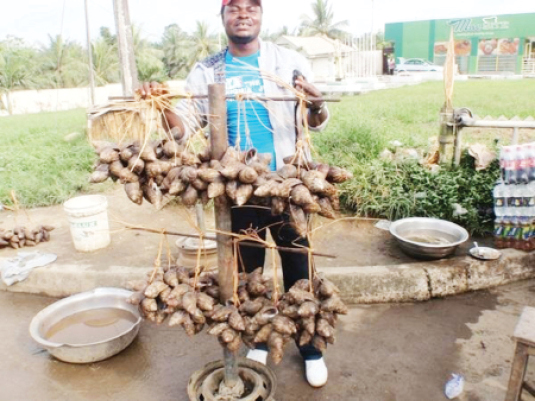How farmers can make profit from snail value chain – Experts
Some experts have outlined measures farmers can adopt to overcome challenges and tap into the lucrative snail value chain. The experts spoke in separate interviews with the News Agency of Nigeria (NAN) on Wednesday in Lagos. A snail farming consultant, Mr Ukonu Ukonu, said farmers required adequate training before venturing into the sector. He also […]

a snail farmer
Some experts have outlined measures farmers can adopt to overcome challenges and tap into the lucrative snail value chain.
The experts spoke in separate interviews with the News Agency of Nigeria (NAN) on Wednesday in Lagos.
A snail farming consultant, Mr Ukonu Ukonu, said farmers required adequate training before venturing into the sector.
He also restated the need for intensive investment to harness the gains of snail value chain, which he said is lucrative.
- As rainy season begins, farmers should not ignore weather prediction
- NIHORT to conduct research on watermelon diseases dislodging Bauchi farmers to Cameroon
“The major challenge we have in snail farming is that some farmers do not have the adequate training before venturing into the trade.
“Snail farmers need adequate training to understand the lifestyle of snails. Lack of understanding of snails made many farmers fail to get proper housing system and adequate feeds for them,” he said.
According to him, snail farmers also require adequate capital to invest in snail slime, which is capital intensive.
“Poor funding can slow farmers down in terms of acquiring the machines to extract the slime.
“Snails are hermaphrodites and as a result of that they multiply exponentially. They produce a lot and the farmers can sell in a short time because of the growing demand for it,” Ukonu said.
He also said snail farmers must begin to take advantage of the export market, which he said is presently fraught with challenges.
“Not many farmers export snails due to the hassles of going through the Nigerian Export Promotion Council (NEPC), appropriate packaging, among others, before they can export.
“So, they would rather sell to the middlemen who then do the exporting.
“Another reason for low exports of the produce is that there is a large enough market for snail meat locally,” he said.
He, however, encouraged snail farmers to focus on exporting the snail slime, which, according to him, is a lot easier to package and export than the meat.
“We can encourage new entrants into snail farming by teaching people the value of snail farming.
“We need more sensitisation and advocacy to encourage more farmers into the sector, especially the youth.
“Our people need a clear understanding of snail farming before venturing into it. Training and sensitisation are key in snail farming,” he added.
Mr Onyekachi Nwagba, a snail farmer, agreed with him, saying that there is need for new entrants into the sector.
He also emphasised the need for adequate funding to enable snail farmers expand their operations.
“The major challenge in Nigerian snail farming is that we lack interested farmers who are willing to go into the trade.
“This is because most people do not believe snail farming is beneficial. There is always the challenge of getting market outlets for the snail meat.
“Also, the issue of adequate finance is a problem we face in snail farming. It is often said one can start small and grow big, but it costs a lot to float a snail farm and get the adequate equipment.
“Processing of the snail and extraction of snail slime is also quite expensive as getting the machine is cost-intensive,” he said.
According to him, to operate a snail farm on commercial basis needs a lot of funds.
“Snail farming is very lucrative. With an investment of N300,000, you can make a minimum of N600,000 half yearly.
“There are several value chains in snail farming and if a farmer explores all, he will make some reasonable profits.
“If you want to engage in trading in snail meat alone, the farmer may not be making so much profit.
“We encourage new entrants into the sector through training and follow up on their farms from time to time,” Nwagba said. (NAN)
